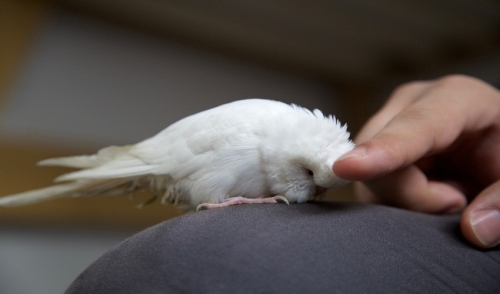
Diseases amongst birds can be quick and deadly, so it is your job as a pet owner to identify illness and bring the bird to the vet when needed. One of the most common issues amongst birds are respiratory issues and there are tell-tale signs to check if your bird is affected by this. Birds use muscles located in the base of the tail for breathing, similar to how humans use the diaphragm. If you see excessive tail bobbing, this is usually a sign of serious respiratory illness and should be treated immediately. If you observe your bird breathing with its mouth open while at rest, this is usually a more serious symptom and indicates that your bird may have been sick for a while and needs urgent medical care. Cloudy eyes can also be an indicator of respiratory problems. If there is discharge coming from your bird’s eyes or you notice anything else irregular, you should seek medical advice.
Weight loss can also be deadly for a bird. Birds usually try to conceal this; therefore prolonged ruffling of the feathers is usually an indicator of weight loss. If your bird stops eating, this may be a sign of impaction and it is crucial that you bring your bird to the vet as soon as possible. Birds have a very fast metabolism, so any sign of reduced eating or irregular appetite can be a red flag. You can simply weigh your bird regularly to make sure that it is not losing weight. Other ways to check for illness are to observe the birds cere, the patch of skin right above its beak where the nostrils are located. If this appears to be irritated or inflamed, or if there is discharge, seek medical attention.
It is important that you clean you bird’s cage regularly to check for irregular droppings. If the bird’s droppings are tar, yellow, or rust colored, and this is unusual from the droppings it usually leaves, then the bird may have internal bleeding and it is imperative that you bring the bird to the vet. It is also possible to tell the mood of the bird by listening to irregularities in its vocal patterns. If you are familiar with your bird’s vocal patterns, this should not be too hard to notice. It’s usually just a small indicator but should be heeded nonetheless. If you keep a close watch on your bird, any of these signs will be easily noticed and early detection of issues will help your bird to a long and healthy life.

Comments